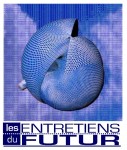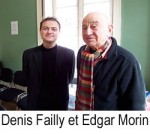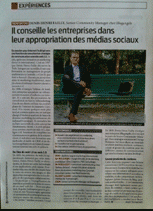29 mars 2007
Future Prospects For Marketing Prospective (1)
I - Prospective & Marketing
As an “Intellectual indiscipline”, the aim of ‘prospective’(2) is to “anticipate action, to look far into the future, wide and deep” (Gaston Berger). The approach for the prospective researcher is to cast a light on possible actions by focusing on the possible and desirable futures.
This article is about whether Prospective, which is spread over a long-term span, could cross-fertilise others fields and specifically Marketing. Marketeers who fail to master all the subtleties related to the understanding of future trends could well be inspired by the art of ‘Prospective’ when it comes to improving their understanding of their clients.‘Prospective’ puts its finger on “what could occur?”, hinges upon strategy and is not inconsistent with Strategic Marketing, since the latter is about answering the following questions: “what can I do about it?, what I am going to do? , and how to do it?” (Michel Godet). To put in the words of Pierre F. Gonod, ‘Prospective’ is systemic, multi-dimensional and transverse. Besides, it has nothing to do with futurology and any comparison of ‘Prospective’ to any form of futuristic planning would be pointless. ‘Prospective’ is not about making up sales forecasts statistically; it is about eliciting a number of potential trends that we could subsequently use in order to build scenarios through the allocation of a probability. This practice is similar to predictive analysis in datamining, whereby one will resort to experience in order to perform patterns modelling (through the use of Neural networks, Kohonen cards, etc.). From a methodology viewpoint, one can find huge similarities between that definition of ‘Prospective’ and that of Market Surveys whereby areas of customer knowledge can be uncovered as we go along.
II-The Seemingly Diverging Aims of Marketing and ‘Prospective’
The available prospective cases (few of them can unfortunately be disclosed for confidentiality reasons) are often focused on the same industries: manufacturing, energy, defence, territories, transport or technology. Such Prospective surveys are often ordered by all-powerful public service administrations, quasi monopolies and other quangos for which the notion of client often verges on the abstract. Furthermore, some of these studies may be initiated by politicians who use them like means of relaunching their pet-projects when the latter have been ditched for too long against their wishes. Consequently, such studies consider customers just as economic agents (i.e. a mere statistical adjustment factor) that is to say mere consumers in the economic sense of the term but non-marketing entities. As a consequence, these studies where customers are seldom analysed as complex, ever-changing, fluctuating and self-motivated beings, often remain restrictive in their description of reality. It seems inconsistent that customers be treated as these marketing non-entities with no influence on and no link to their environment, whereas in the real world of Marketing, services are ubiquitous, customer behaviours are more and more unpredictable, not to talk about the extreme volatility of customer loyalty.
As a conclusion, in this ever-changing service-focused world, it seems absurd that customers be considered marginal (i.e. having little influence and very dependent on other economic players), with little grasp on the world around them. As a matter of fact, don’t data-intensive businesses consider the share-of-wallet as a more meaningful measure than the traditional market-share ratio? When considering online services, consumers also become producers or even self-producers (hence the coining of the term pro-sumer to depict that situation) of more and more dematerialised goods; all of this makes them capable of initiating market changes by themselves (e.g. the P2P revolution and its influence on the music industry)
III-Complexity As A Common Denominator
If it’s so difficult to allocate a better value to customers in Prospective, this is because of the constant factor of complexity. As expressed in my former article “ A Metaphorical Way Of Understanding Customer Relationship"(3),where I was using the Chaos and Quantum mechanics metaphor, the amazing complexity and elusiveness of today’s Consumers cannot be captured with standard market research and data analysis tools at our disposal. Determinism and rationalism are at the heart of such tools, which prove highly ineffectual.
As a consequence, a few questions arise:
Do we need complex tools to tackle such complex issues or are simple tools that can be used by anybody sufficient, however sketchy they may be,
Should such methods and tools remain in the only hands of experts or should one try and make them usable by all those concerned with the subject,
At last, given that Prospective does not seem to be able to handle these customers, should we deem such a customer Prospective infeasible or even undesirable?
In fact, in order to move the ball forward, a link between the two disciplines would have to be established:
On the one hand, Marketeers could work with prospective professionals in order to enhance their culture of service processes,
On the other hand, those in charge of Prospective could help Marketeers enhance their vision in order to incorporate more variables (economic, demographic, etc.) and provide them with different ways of analysing markets (therefore looking at key hidden variables or latent players or even budding fads that could help Marketeers catch a glimpse of future trends).
IV-The Strategy Factor
Michel Godet has provided ways of describing behaviours (reproduced below) when it comes to handling future situations. We could use this description in order to compare both the Prospective and Marketing approaches with one another and see what sort of incremental benefit could be gained from such comparison. With all due consideration, one could even attempt to look at what Marketing could gain from adopting some of the approaches of Prospective.
First, let us compare the each of these fields as to their time and space dimensions:
Prospective is geared towards the long term (10, 15, 20 years and more), the global vision. With prospective, what matters most is not the result but how one got there in the first place. With Prospective, besides, maps know no boundaries,
Marketing Management is mostly short-term orientated (either very short term or up to 5 years at the most, depending on how far into strategy we are looking). At the end of the day, Marketing management efficiency is measured by bottom-line results.
Potential Behaviours When Handling Future Situations
Passivity: no planned scenarios, mostly tactics but no strategy, aim is to maintain status quo and avoid looking reality in the face,
Re-activity: no planned scenarios, adaptive strategy, respond only when external threats are perceived,
Pre-activity: exploratory scenarios, pre-emptive strategy, prepare business for expected changes,
Pro-activity: scenarios by anticipation, implement changes.
V-The 360° View
In order to improve our approach of customer understanding, we need to go one step further and bring a third essential ingredient: Sociology. Sociologists are best defined as those specialists who decipher social events and mechanisms whereby relationships are built between people and groups of people (community, ‘tribe’, etc.). As such, they are obligatory players in our eyes, when it comes to analysing the elusive social characters that consumers have become (or even citizens for that matter). Individuals do influence markets through the social groups that they belong to (sometimes named ‘tribes’) as much as they are influenced by them (‘feed-back’ effect). As a matter of fact, in the 1970’s, a group of professionals dedicated to ‘social prospective’ had a goal of enhancing Prospective and promote it as part of ‘knowledge sociology’ (P. Gonod). But such skills as are necessary to conduct such a task are rarely to be found in one individual, if one except a few strategic planners, often found in advertising agencies.
Pending the availability of such sophisticated profiles, a 360° view could well be provided by a better cooperation between two kinds of players:
Marketeers who are rather customer-focused (i.e. on behaviour analysis at a micro-economic level),
And specialists in Prospective who are more into vision (at a macro-economic level), into the interactions between various economic players and into exploring possible perspectives (“what could occur”, which possible scenarios, likely, desirable? etc.)
At the end of the day, such cross-fertilisation of disciplines, processes, structures, people and professionals would be aimed at encompassing complexity and this is most certainly bound to bring interesting results.
Denis FAILLY
(1):I published this article in french under the title : "Perspective(s) d'une prospective client"
(2):Our subject here is about that discipline named ‘prospective’ by the eponimous French school, initiated by Gaston Berger & Bertrand de Jouvenel, and Futuribles Review) mainly led today by Michel Godet, a teacher in Prospective (CNAM standing for National Conservatory of Arts and Industries) and Director of the LIPSOR Research Lab (Laboratory of Investigation in Prospective, Strategy and Organization
(3): This article was published in French under the following title : « De l’usage de la métaphore pour penser la connaissance client ».
10:30 Écrit par Denis Henri Failly dans Marketing | Lien permanent | Commentaires (0) | Tags : Prospective |  |
| ![]() Facebook | |
Facebook | |  |
|  Imprimer | |
Imprimer | |
21 mars 2007
Le principe de segmentation marketing à t-il encore un sens ?
Publié sur le Journal du Management le 27 juillet 2005
Du macroscosme au « mésocosme » client 
A l’instar de la physique qui par changement d’échelle ajuste sa focale, du regard « Macro » (le macroscope, le visible ) au « micro » (l’invisible, au cœur du noyau atomique) la segmentation marketing suit un processus métaphoriquement comparable. Il s’agit de découper son marché, sa population de client pour descendre du global au local.
Le graal, la particule élémentaire du Marketer serait de pouvoir décortiquer chaque individu – client (profil, actions, intentions…) pour agir en réel mode One to One. Devant l’impossibilité matérielle et financièrement non rentable d’une telle démarche, sur des volumes de plus en plus énormes de clients, la limite plancher d’aggrégation est bien souvent le segment (niveau intermédiaire « méso » qui serait à l’image du regard au niveau moléculaire du scientifique).
Identifiable, manipulable, exploitable (nécessité d’un minimum d’individus par segments) la segmentation permet ainsi de créer des répartitions, des groupes d’individus de telle manière que les unités au sein d’un même groupe soient les plus semblables (homogénëité intra) entre elles et les plus dissemblables d’un groupe à l’autre (hétérogénëité inter).
A partir de ce principe de base, moult méthodes intégrées dans des applications Crm et Datamining permettent via la statistique classique ou des algorythmes plus avancés (application Crm et Datamining…) de « partitionner » ses clients.
Divisez sans relier n’est pas connaître 
La pratique de la segmentation nous rappelle étrangement un des principes de la rhétorique cartésienne pour laquelle l’analyse (du grec analusis = décomposition, la lyse en biochimie = coupure, séparation) consiste à découper l’objet d’étude en autant de parties élementaires séparées les unes des autres pour avoir connaîssance du tout.
On constate déjà dans ce principe la volonté de disjoindre et de cloisonner (non transversalité).
En analyse de base de données, le marketing fait donc appel pour décider et agir à des méthodes de découpage, de compartimentation issues de sciences « académiques » dites exactes. On peut donc s’interroger à l’heure d’une réthorique Marketing qui se prétend hautement relationnelle, sur la légitimité d’un quantitativisme qui, utilisé à l’excès, réduirait de fait le « sujet - client» à un seul objet de dénombrement.
Ce réductionnisme ampute naturellement la connaissance du client dans sa constitution multidimensionnelle, sa définition complexe et psycho-sociologique.
Un marketing en recomposition
Ce constat est d’ailleurs à rapprocher des pratiques alternatives du Marketing (street marketing, marketing expèrientiel, intermédiation C to C…) qui est à la mesure de l’insensibilisation croissante des clients et notamment des plus jeunes aux « mécaniques » classiques de marketing et de communication.
Ce « néo » marketing à visage humain (H to H : Human to Human) en émergence devient « in vivo » en se recentrant sur la vie réelle, le mouvement, l’affect, l’émotion, le sens.
L’assise scientifique d’une connaissance
D’Aristote à Auguste Comte en passant par Descartes nous gardons ancré en nous l’héritage (formatage ?) des critères de la scientificité d’une connaissance :
- Hypothèse ontologique : les phénomènes connaissables ont une réalité extérieur à l’observateur
- Hypothèse déterministe : principe de causalité et invariance des lois auxquels sont assujettis les phénomènes
- Réductionnisme : diviser en autant de parties qu’il se peut
- Principe de raison suffisante (logique déductive): exemple du syllogisme qui fonde une conclusion sur deux propositions posées comme vraies (tous les hommes sont mortels, or Socrate est un homme, donc Socrate est mortel).
Ces oukases de la scientificité ne sont plus gravés dans le marbre, au vu de l’évolution de certaines sciences (physique quantique, sciences du chaos et des systèmes non linéaires et complexes…). Mais les sciences dites de gestion, par nécessité d’être reconnues dans l’arbre « reconnaissant » des connaissances officielles et certainement non contente d’être qualifiées stupidement de sciences molles, ont adopté, emprunté des méthodologies scientifiques (la cybernétique étant aussi passée par là).
Naturellement les sciences de gestion ont contaminé l‘ensemble des disciplines s’y rattachant avec des méthodes aux fondements scientifiques (mathématiques de la décision, statistiques, recherche opérationnelles, modèles d’optimisation…).
Le Marketing, « inter ou trans-discipline » par excellence, n’avait donc aucune raison d’être épargné par « cet emprunt scientifique » tant et si bien que le Client a été intégré progressivement comme objet de connaissance.
Ainsi donc aujourd’hui ce même client enregistré en base ou en entrepôt de données est traité par les « Crmistes » comme une ontologie c’est à dire, un objet de la nature, une donnée « à priori », extèrieure à son observateur.
Cette perspective reviendrait donc à dire que le client existerait indépendemment de la représentation que nous en avons et surtout indépendamment de l’observateur (marketer, analyste de données).
De la segmentation à la défragmentation 
Le regard sociologique (post ou hypermoderne) s’attache moins à l’individu (in-divisible) comme singularité, qu’à la personne (du latin personna = masque) multi - appartenante à des communautés, des « galaxies » virtuelles ou réelles, des « micro-sociétés » liquides, instables, mouvantes. La nouvelle logique de groupement serait donc inversée, moins réductrice que la segmentation puisque il s’agirait de recomposer, de « relier » au lieu de « délier ». Bref une vision plus de l’ordre du « champs » (au sens de la Physique), du « maillage clients» éphémère, flou et souple, voir même de l’Attracteur étrange (cf théorie du chaos). Cette vision ne ferait plus du client un simple Objet clos du « connaître », mais un vrai Projet de connaissance ouverte.
Denis FAILLY
01:05 Écrit par Denis Henri Failly dans Marketing | Lien permanent | Commentaires (0) | Tags : Marketing, marketing, post modernité, compexité, web 2.0, client, crm |  |
| ![]() Facebook | |
Facebook | |  |
|  Imprimer | |
Imprimer | |
16 mars 2007
LES ENTRETIENS DU FUTUR
 Plus qu'une époque de changement nous assistons à un changement d'époque, dans de nombreux domaines des activités humaines l'heure des remises en cause (ruptures ou transitions) a sonné et signifie des changements de paradigmes, des façons de percevoir, ressentir, représenter, agir/interagir différentes, bref d'"être au monde" autrement selon des "alters"logiques. (Re)concilier les contraires, intégrer l'impérieuse urgence de la biosphère et du respect de ses équilibres dans nos innovations, concevoir le caractère multi-dimensionnel, complexe, protéiforme, incertain et flou dans nos démarches, penser transversalement, penser hybridation/métissage, et multiplidisciplinarité, promouvoir et mettre en oeuvre la lithanie des "co" (co création, co-évolution, coopétition, co-llaboration, co-nnexion...), suciter l'imagination, tels pourraient être les quelques mots clés signifiants de l'esprit dans lequel s'inscrivent ces "ENTRETIENS DU FUTUR"
Plus qu'une époque de changement nous assistons à un changement d'époque, dans de nombreux domaines des activités humaines l'heure des remises en cause (ruptures ou transitions) a sonné et signifie des changements de paradigmes, des façons de percevoir, ressentir, représenter, agir/interagir différentes, bref d'"être au monde" autrement selon des "alters"logiques. (Re)concilier les contraires, intégrer l'impérieuse urgence de la biosphère et du respect de ses équilibres dans nos innovations, concevoir le caractère multi-dimensionnel, complexe, protéiforme, incertain et flou dans nos démarches, penser transversalement, penser hybridation/métissage, et multiplidisciplinarité, promouvoir et mettre en oeuvre la lithanie des "co" (co création, co-évolution, coopétition, co-llaboration, co-nnexion...), suciter l'imagination, tels pourraient être les quelques mots clés signifiants de l'esprit dans lequel s'inscrivent ces "ENTRETIENS DU FUTUR"Cet espace est une agora interactive et multi - média où vous pourrez trouver des témoignages,C cas pratiques, écrits, conférences, interviews, liens, références d'auteurs, de praticiens, de personnalités...dont la réflexion, la contribution, l'action nous semble symptomatique (descriptive, explicative, prospective) des ressorts, enjeux et mutations de ce monde qui vient... .
Bonne lecture, interaction, réflexion, contribution, innovation...
11:10 Écrit par Denis Henri Failly dans Marketing, Prospective, Science | Lien permanent | Commentaires (0) | Tags : Denis failly;entretien du futur |  |
| ![]() Facebook | |
Facebook | |  |
|  Imprimer | |
Imprimer | |
14 mars 2007
Internet et complexité
Toujours dans le cadre de la conférence Intellignece de la complexité voici en vidéo :
Ma question à Edgar Morin relative à Internet (sous entendu comme objet/sujet de pensée complexe)
La réponse d'Edgar Morin notamment sur le caractère hologrammatique du Web, caractère qui constitue l'un des éléments pour penser le complexe
21:05 Écrit par Denis Henri Failly | Lien permanent | Commentaires (0) |  |
| ![]() Facebook | |
Facebook | |  |
|  Imprimer | |
Imprimer | |
04 mars 2007
Edgar Morin - Intelligence de la complexité
J'étais ce Vendredi invité au petit déjeuner organisé par Armand Braun de la Société Internationale des Conseillers de Synthèse (SICS) pour la sortie d de l'ouvrage "Intelligence de la Complexité" dans le cadre du Colloque de Cerisy de 2005.
"C’est à un véritable mouvement de la pensée qu’Edgar Morin nous invite aujourd'hui : alors qu’un savoir fragmentaire et dispersé nous rend de plus en plus aveugles à nos problèmes fondamentaux, l’intelligence de la complexité devient un besoin vital pour nos personnes, nos cultures, nos sociétés" je rajouterai que ceci est impérieusement valable aussi pour le marketing, le management et disciplines connexes.
J'ai retrouvé quelques visages familliers de l'association pour la pensée complexe (astrophysiciens, mathématiciens, épistémologues...) et j'ai eu le grand bonheur de rencontrer et m'entretenir avec Edgar Morin qu'on ne présente plus (enfin pour les ignares voir ici)

Autour de Edgar Morin nous avons retrouvé Jean Louis Lemoigne (voir mon interview) et Edith Heurgon tous 3 intervenants que vous pouvez retrouver dans les vidéos qui suivent :
Edgar Morin - Sur l'émergence de la complexité - vidéo 1
Edgar Morin - Sur l'émergence de la complexité - vidéo 2
Jean Louis Le Moigne - Introduction à l'ouvrage et à la démarche
Edith Heurgon - Introduction à l'ouvrage et au Colloque de Cerisy
*Edith Heurgon est Docteur en mathématiques, ancienne responsable de La Prospective à la RATP, co-directrice de la collection "Prospective du présent" des Editions de l'aube et co-directrice du Centre international de Cerisy où elle organise chaque année depuis 1999 un colloque de Prospective
16:50 Écrit par Denis Henri Failly dans Livre, Marketing, Prospective, Science | Lien permanent | Commentaires (4) | Tags : complexité, edgar morin, jean louis le moigne, épistémologie |  |
| ![]() Facebook | |
Facebook | |  |
|  Imprimer | |
Imprimer | |








